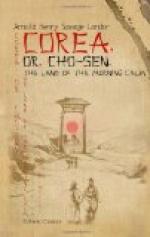The name Corea, or Korea, you may as well forget or discard as useless, for to the Corean mind the word would not convey any definite idea. Not even would he look upon it as the name of his country. The real native name now used is Cho-sen, though occasionally in the vernacular the kingdom goes by the name of Gori, or the antiquated Korai. There is no doubt that the origin of the word Corea is Korai, which is an abbreviation of Ko-Korai, a small kingdom in the mountainous region of the Ever White Mountains, and bordering upon the kingdom of Fuyu, a little further north, whence the brave and warlike people probably descended, who conquered old Cho-sen. The authorities on Corean history, basing their arguments on Chinese writings, claim that the present people of Cho-sen are the true descendants of the Fuyu race, and that the kingdom of Ko-Korai lay between Fuyu on the northern side and Cho-sen on the southern, from the former of which a few families migrated towards the south, and founded a small kingdom west of the river Yalu, electing as their king a man called Ko-Korai, after whom, in all probability, the new nation took its name. Then as their numbers increased, and their adventurous spirit grew, they began to extend their territory, north, south, and west, and in this latter direction easily succeeded in conquering the small kingdom of Wuju and extending their frontier as far south as the river Tatung, which lies approximately on parallel 38 deg. 30”.
During the time of the “Three Realms” in China, between the years 220 and 277 A.D., the Ko-Korai people, profiting by the weakness of their neighbours, and therefore not much troubled with guerrillas on the northern frontier, continued to migrate south, conquering new ground, and so being enabled finally to establish their capital at Ping-yan on the Tatong River. After a comparatively peaceful time with their northern neighbours for over 300 years, however, towards the end of the sixth century, China began a most micidial war against the king of Ko-Korai, or Korai, as it was then called, the “Ko” having been dropped. It seems that even in those remote days the Chinese had no luck in the land of Cho-sen, and though army after army, and hundreds of thousands of men were sent against them, the brave Korai people held their own, and far from being defeated and conquered, actually drove the enemy out of the country, killing thousands mercilessly in their retreat, and becoming masters of the Corean Peninsula as far south as the River Han.
To the south of Korai were the states of Shinra and Hiaksai, and between these and Korai, there was for a couple of centuries almost perpetual war, the only intervals being when the latter kingdom was suffering at the hands of the formidable Chinese invaders. But as I merely give this rough and very imperfect sketch of Corean history, to explain how the word Korai originated and was then applied to the whole of the peninsula, I must now proceed to explain in bold touches how the other states became united to Korai.




